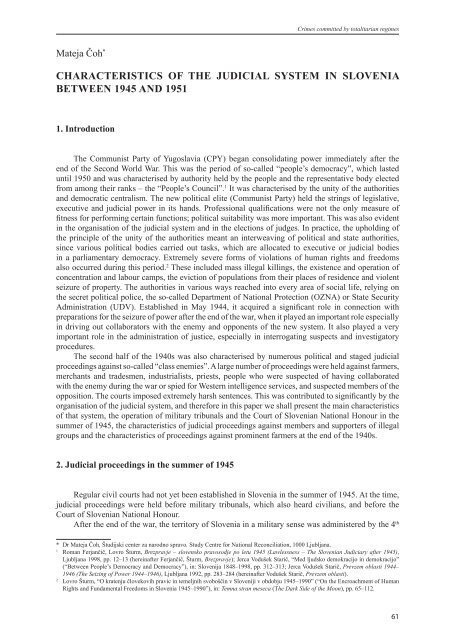crimes committed by totalitarian regimes - Ministrstvo za pravosodje
crimes committed by totalitarian regimes - Ministrstvo za pravosodje
crimes committed by totalitarian regimes - Ministrstvo za pravosodje
Create successful ePaper yourself
Turn your PDF publications into a flip-book with our unique Google optimized e-Paper software.
Crimes <strong>committed</strong> <strong>by</strong> <strong>totalitarian</strong> <strong>regimes</strong><br />
Mateja Čoh *<br />
Characteristics of the judicial system in Slovenia<br />
between 1945 and 1951<br />
1. Introduction<br />
The Communist Party of Yugoslavia (CPY) began consolidating power immediately after the<br />
end of the Second World War. This was the period of so-called “people’s democracy”, which lasted<br />
until 1950 and was characterised <strong>by</strong> authority held <strong>by</strong> the people and the representative body elected<br />
from among their ranks – the “People’s Council”. 1 It was characterised <strong>by</strong> the unity of the authorities<br />
and democratic centralism. The new political elite (Communist Party) held the strings of legislative,<br />
executive and judicial power in its hands. Professional qualifications were not the only measure of<br />
fitness for performing certain functions; political suitability was more important. This was also evident<br />
in the organisation of the judicial system and in the elections of judges. In practice, the upholding of<br />
the principle of the unity of the authorities meant an interweaving of political and state authorities,<br />
since various political bodies carried out tasks, which are allocated to executive or judicial bodies<br />
in a parliamentary democracy. Extremely severe forms of violations of human rights and freedoms<br />
also occurred during this period. 2 These included mass illegal killings, the existence and operation of<br />
concentration and labour camps, the eviction of populations from their places of residence and violent<br />
seizure of property. The authorities in various ways reached into every area of social life, relying on<br />
the secret political police, the so-called Department of National Protection (OZNA) or State Security<br />
Administration (UDV). Established in May 1944, it acquired a significant role in connection with<br />
preparations for the seizure of power after the end of the war, when it played an important role especially<br />
in driving out collaborators with the enemy and opponents of the new system. It also played a very<br />
important role in the administration of justice, especially in interrogating suspects and investigatory<br />
procedures.<br />
The second half of the 1940s was also characterised <strong>by</strong> numerous political and staged judicial<br />
proceedings against so-called “class enemies”. A large number of proceedings were held against farmers,<br />
merchants and tradesmen, industrialists, priests, people who were suspected of having collaborated<br />
with the enemy during the war or spied for Western intelligence services, and suspected members of the<br />
opposition. The courts imposed extremely harsh sentences. This was contributed to significantly <strong>by</strong> the<br />
organisation of the judicial system, and therefore in this paper we shall present the main characteristics<br />
of that system, the operation of military tribunals and the Court of Slovenian National Honour in the<br />
summer of 1945, the characteristics of judicial proceedings against members and supporters of illegal<br />
groups and the characteristics of proceedings against prominent farmers at the end of the 1940s.<br />
2. Judicial proceedings in the summer of 1945<br />
Regular civil courts had not yet been established in Slovenia in the summer of 1945. At the time,<br />
judicial proceedings were held before military tribunals, which also heard civilians, and before the<br />
Court of Slovenian National Honour.<br />
After the end of the war, the territory of Slovenia in a military sense was administered <strong>by</strong> the 4 th<br />
* Dr Mateja Čoh, Študijski center <strong>za</strong> narodno spravo, Study Centre for National Reconciliation, 1000 Ljubljana.<br />
1<br />
Roman Ferjančič, Lovro Šturm, Brezpravje – slovensko <strong>pravosodje</strong> po letu 1945 (Lawlessness – The Slovenian Judiciary after 1945),<br />
Ljubljana 1998, pp. 12–13 (hereinafter Ferjančič, Šturm, Brezpravje); Jerca Vodušek Starič, “Med ljudsko demokracijo in demokracijo”<br />
(“Between People’s Democracy and Democracy”), in: Slovenija 1848–1998, pp. 312–313; Jerca Vodušek Starič, Prevzem oblasti 1944–<br />
1946 (The Seizing of Power 1944–1946), Ljubljana 1992, pp. 283–284 (hereinafter Vodušek Starič, Prevzem oblasti).<br />
2<br />
Lovro Šturm, “O kratenju človekovih pravic in temeljnih svoboščin v Sloveniji v obdobju 1945–1990” (“On the Encroachment of Human<br />
Rights and Fundamental Freedoms in Slovenia 1945–1990”), in: Temna stran meseca (The Dark Side of the Moon), pp. 65–112.<br />
61




